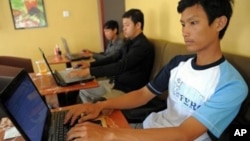PHNOM PENH - A draft law to govern the Internet in Cambodia has many advocates worried about online suppression, as more and more Cambodians enter cyberspace. The country has seen an explosion of online users in the past two years, creating a space for discussion and government criticism unknown in the past.
Government officials say they need time to draft a proper law to protect digital information and institutions, and that it won’t be used to curb dissent. But freedom advocates aren’t so sure. Some 200 bloggers and technology experts from 15 countries hotly debated the issue at a five-day conference, called BlogFest, in Siem Reap earlier this month.
The government estimates that Cambodia had about 1.68 million Internet users in 2011, a jump from just 320,000 the year before. The country has an estimated 3,000 bloggers and 700,000 Facebook users.
The draft law has contributions from the National Information and Communications Technology Development Authority, or Nida, the Council of Ministers, the National Bank of Cambodia, and the ministries of Commerce and Telecommunications, though it has not reached the top level of any of these for approval. That means it will take a long time to draft and approve for legislation, Information Minister Khieu Kanharith told reporters at BlogFest.
Sorn Ramana, a project coordinator for the Cambodian Center for Human Rights and a blogger, said the draft law may not be intended to serve Cambodian Internet users. “I’m pessimistic about Internet freedom in Cambodia,” she said. “Because in the near future, we’re likely to see more suppression, as the government drafts the cyber law. I’m concerned that the law could be used to justify suppression of Internet freedom in the country.”
David Isaksson, who heads the media consulting group Global Reporting, was a guest speaker at BlogFest. He too shared concerns about the cyber law. In many countries, such laws tend to be used to restrict Internet freedoms, he said.
“I am not an expert at all about the cyber law in Cambodia,” he said. “But what we can know is that governments or regimes have used the cyber law as a pretext, to talk about the risk of photography, abuses or protecting national security. In fact a cyber law is usually used to crack down on political dissidents, cultural activists and civil society.”
Government spokesman Phay Siphan said the law was not being drafted to suppress dissent, but was needed to stop “cyber crimes.”
“It solely involves tools for protecting formal, private and copy-righted data from hacking, or the destruction of users’ formal data, especially banks and related institutions,” he said. The law will not be used to censor digital content like letters, photographs, video and other media, or to limit freedom of expression online, he said.
Government officials say they need time to draft a proper law to protect digital information and institutions, and that it won’t be used to curb dissent. But freedom advocates aren’t so sure. Some 200 bloggers and technology experts from 15 countries hotly debated the issue at a five-day conference, called BlogFest, in Siem Reap earlier this month.
The government estimates that Cambodia had about 1.68 million Internet users in 2011, a jump from just 320,000 the year before. The country has an estimated 3,000 bloggers and 700,000 Facebook users.
The draft law has contributions from the National Information and Communications Technology Development Authority, or Nida, the Council of Ministers, the National Bank of Cambodia, and the ministries of Commerce and Telecommunications, though it has not reached the top level of any of these for approval. That means it will take a long time to draft and approve for legislation, Information Minister Khieu Kanharith told reporters at BlogFest.
Sorn Ramana, a project coordinator for the Cambodian Center for Human Rights and a blogger, said the draft law may not be intended to serve Cambodian Internet users. “I’m pessimistic about Internet freedom in Cambodia,” she said. “Because in the near future, we’re likely to see more suppression, as the government drafts the cyber law. I’m concerned that the law could be used to justify suppression of Internet freedom in the country.”
David Isaksson, who heads the media consulting group Global Reporting, was a guest speaker at BlogFest. He too shared concerns about the cyber law. In many countries, such laws tend to be used to restrict Internet freedoms, he said.
“I am not an expert at all about the cyber law in Cambodia,” he said. “But what we can know is that governments or regimes have used the cyber law as a pretext, to talk about the risk of photography, abuses or protecting national security. In fact a cyber law is usually used to crack down on political dissidents, cultural activists and civil society.”
Government spokesman Phay Siphan said the law was not being drafted to suppress dissent, but was needed to stop “cyber crimes.”
“It solely involves tools for protecting formal, private and copy-righted data from hacking, or the destruction of users’ formal data, especially banks and related institutions,” he said. The law will not be used to censor digital content like letters, photographs, video and other media, or to limit freedom of expression online, he said.







